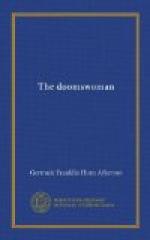She died within three days. The good priest, who stood to his post and made each of his afflicted poor a brief daily visit, prayed by her as she fell into stupor, but she was incapable of receiving extreme unction. Estenega was alone with her when she died, but the priest returned a few moments later.
“Don Thomas Larkin wishes me to say to you, Don Diego Estenega,” said the Father, “that he would be glad to have you stay with him until the next vessel arrives. As two members of his family have the disease, he has nothing to fear from you. I will care for the body.”
Estenega handed him money for the burial, and looked at him speculatively. The priest must have heard the girl’s confessions, and he wondered why he did not improve the opportunity to reprove a man whose indifference to the Church was a matter of indignant comment among the clergy. The priest appeared to divine his thoughts, for he said:
“Thou hast done more than thy duty, Don Diego. And to the frailties of men I think the good God is merciful. He made them. Go in peace.”
Estenega accepted Mr. Larkin’s invitation, but, in spite of the genial society of the consul, he spent in his house the most wretched three weeks of his life. He dared not leave Monterey until he had passed the time of incubation, having no desire to spread the disease; he dared not write to Chonita, for the same reason. What must she think? She supposed him to have sailed, of course, but he had promised to write her from Monterey, and again from San Diego. And the uncertainty regarding his Mexican affairs was intolerable to a man of his active mind and supertense nervous system. His only comfort lay in Mr. Larkin’s assurance that the national bark Joven Guipuzcoana was due within the month and would return at once. Early in the fourth week the assurance was fulfilled, and by the time he was ready to sail again his danger from contagion was over. But he embarked without writing to Chonita.




